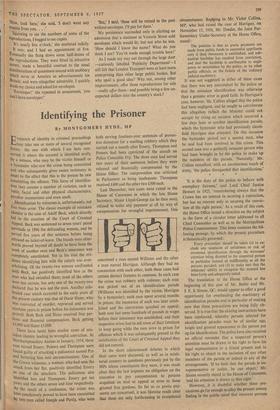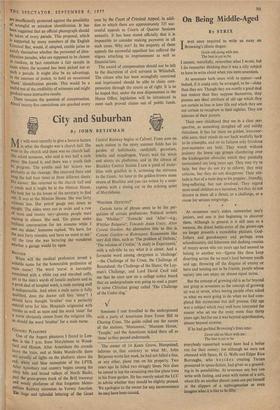Identifying the Prisoner
By MONTGOMERY HYDE, MP EVIDENCE of identity in criminal proceedings may take one or more of several recognised forms: the one with which I am here con- cerned is where the accused is identified orally by a witness, who may be the victim himself or a bystander who saw the crime being committed and who subsequently gives sworn testimony in court to the effect that this is the person he saw committing the offence. This form of identifica- tion may assume a number of varieties, such as voice, facial and other physical characteristics, Peculiar mannerisms and even smell.
Identification by witnesses is, unfortunately, not free from error. The classic example of mistaken identity is the case of Adolf Beck, which directly' led to the creation of the Court of Criminal Appeal. Beck was sentenced to seven years' penal servitude in 1896 for defrauding women, and he served five years of this sentence before being released on ticket-of-leave. The frauds were after- Wards proved beyond all doubt to have been the work of another man and Beck's innocence was Completely established. Yet at his trial the evi- dence identifying him with the culprit was over- whelming. Of the twenty-two women confronted with Beck, ten positively identified him as the man who had swindled them; most of the others Were less certain, but only one of the twenty-two declared that he was not the man. Another cele- brated case which occurred in the early years of the present century was that of Oscar Slater, who Was convicted of murder, reprieved and served nineteen years in prison before his innocence was preyed. Both Beck and Slater received free par- dons and financial compensation, Beck getting £4,000 and Slater £5,000. There have lately been similar cases of mis- taken identity leading to wrongful conviction. At Northamptonshire Assizes in January, 1954, three men named Emery, Powers and Thompson were found guilty of attacking a policeman named Pye and battering him into unconsciousness. One of the Crown witnesses, a woman, who had seen the attack from her flat, positively identified Emery as one of the attackers. The policeman also identified him and Thompson. Emery got ten years and the others seven and four respectively. As the result of a confession, the crime was later conclusively proved to have been committed by two men called Joseph and Purdy, who were both serving fourteen-year sentences of preven- tive detention for a mailbag robbery which they carried out a month after Emery, Thompson and Powers had been convicted of the assault on Police Constable Fry. The three men had served two years of their sentences before they were released and financially compensated by the Home Office. The compensation was criticised in Parliament as being inadequate. Thompson received £400 and the other two £300 each.
Last December, two cases were raised in the House of Commons in which the late Home Secretary, Major Lloyd-George (as he then was), refused to make any payment at all by way of compensation for wrongful imprisonment. One concerned a man named Williams and the other a man named Harrigan. Although they had no connection with each other, both these cases had certain distinct features in common. In each case the crime was robbery with violence; each man was picked out of an identification parade (Williams was identified by the victim, Harrigan by a bystander); each man spent several months in prison; the innocence of each was later estab- lished and the convictions quashed on appeal; both men lost some hundreds of pounds in wages before their innocence was established, and their respective wives had to sell some of their furniture to keep going while the men were in prison for offences which it was subsequently proved to the satisfaction of the Court of Criminal Appeal they did not commit.
In the short adjournment debates in which their cases were discussed, as well as in minis- terial answers to questions previously put by the MPs whose constituents they were, it was made ,clear that the law imposes no obligation on the executive to pay compensation to persons acquitted on trial or appeal or even to those granted free pardons. So far as ex gratin pay- ments are concerned, it was likewise made clear that these are only forthcoming in exceptional circumstances. Replying to Mr. Victor Collins, MP, who had raised the case of Harrigan, on November 15, 1956, Mr. Deedes, the Joint Par- liamentary Under-Secretary at the Home Office, stated : The position is that ex gratis payments are made from public funds to successful appellants only if their innocence is established, and sub- stantial hardship has resulted from conviction, and that the hardship is attributable to negli- gence or misconduct by the police, or by other public officials, or the failure of the ordinary judicial machinery.
It was not suggested in either of these cases that there was any misconduct by the police or that the mistaken identification was otherwise than a genuine error in good faith. In Harrigan's case, however, Mr. Collins alleged that the police had been negligent, and he sought to corroborate this allegation (which the Minister could not accept) by citing an incident which occurred a few days later at another identification parade, which the bystander who had previously identi- field Harrigan' also attended. On this occasion the bystander picked out a second man, who he said had been involved in this crime. This second man was a perfectly innocent person who had been brought in by the police to make up the numbers of the parade. 'Naturally,' Mr. Collins remarked, with an unconscious touch of irony, 'the police disregarded that identification,' 'It is the duty of the police to behave with exemplary fairness,' said Lord Chief Justice Hewart in 1925, 'remembering always that the Crown has no interest in securing a conviction, but has an interest only in securing the convic- tion of the right person.' As a result of this case, the Home Office issued a directive on the subject in the form of a circular letter addressed to all Chief Constables as well as to the Metropolitan Police Commissioner. This letter contains the fol- lowing passage, by which the present procedure is theoretically governed : Every precaution should be taken (a) to ex- clude any suspicion of unfairness or risk of erroneous identification through the witnesses' attention being directed to the suspected person in particular instead of indifferently to all the persons paraded; and (b) to make sure that the witnesses' ability to recognise the accused has been fairly and adequately tested.
The translation to the Home Office at the beginning of this year of Mr. Butler and Mr. J. E. S. Simon, QC, would appear to offer a good opportunity for overhauling the machinery of identification parades and in particular of making sure that these precautions are being fully ob- served. It is true that the existing instructions have been reinforced, whereby persons selected for identification parades must be of similar age, height and general appearance, to the person put up for identification. The police have also received an official reminder that a suspected person's attention must be drawn to his right to have his legal representative or a friend present and to his right to object to the inclusion of any other members of the parade or indeed to any of the arrangements. 'If he feels that the parade is un- representative or unfair, he can object,' Mr. Simon recently stated in the House of Commons, 'and his attention is drawn to that right.' However, it is doubtful whether these pre- cautions go far enough to allay the present uneasy feeling in the public mind that innocent persons are insufficiently protected against the possibility of wrongful or mistaken identification. It has been suggested that an official photograph should be taken of every parade. This proposal, which Is supported by many members of the English Criminal Bar, would, if adopted, enable juries to satisfy themselves whether the personnel of iden- tification parades, who are supposed to be chosen at random, in fact constitute a fair sample in cases where the accused has been picked out at such a parade. It might also be an advantage, !II the interests of justice, to hold an occasional blank' identification parade. This would be a useful test of the credibility of witnesses and might Produce some instructive results.
There remains the question of compensation. About twenty-five convictions are quashed every year by the Court of Criminal Appeal, in addi- tion to which there are approximately 325 suc- cessful appeals to Courts of Quarter Sessions annually. It has been stated officially that it is impossible to consider making payments in all such cases. Why not? In the majority of these appeals the successful appellant has suffered the stigma attaching to imprisonment as well as financial loss.
The award of compensation should not be left to the discretion of civil servants in Whitehall. The citizen who has been wrongfully convicted and imprisoned should be able to claim com- pensation through the courts as of right. It is to be hoped that, under the new dispensation in the Home Office, legislation will be introduced to meet such proved claims out of public funds.

































 Previous page
Previous page